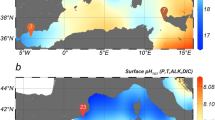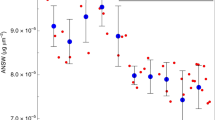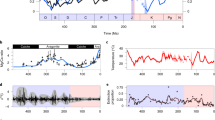Abstract
The global increase in atmospheric carbon dioxide concentration is potentially threatening marine biodiversity in two ways. First, carbon dioxide and other greenhouse gases accumulating in the atmosphere are causing global warming1. Second, carbon dioxide is altering sea water chemistry, making the ocean more acidic2. Although temperature has a cardinal influence on all biological processes from the molecular to the ecosystem level3, acidification might impair the process of calcification or exacerbate dissolution of calcifying organisms4. Here, we show however that North Atlantic calcifying plankton primarily responded to climate-induced changes in temperatures during the period 1960–2009, overriding the signal from the effects of ocean acidification. We provide evidence that foraminifers, coccolithophores, both pteropod and non-pteropod molluscs and echinoderms exhibited an abrupt shift circa 1996 at a time of a substantial increase in temperature5 and that some taxa exhibited a poleward movement in agreement with expected biogeographical changes under sea temperature warming6,7. Although acidification may become a serious threat to marine calcifying organisms, our results suggest that over the study period the primary driver of North Atlantic calcifying plankton was oceanic temperature.
This is a preview of subscription content, access via your institution
Access options
Subscribe to this journal
Receive 12 print issues and online access
$209.00 per year
only $17.42 per issue
Buy this article
- Purchase on Springer Link
- Instant access to full article PDF
Prices may be subject to local taxes which are calculated during checkout



Similar content being viewed by others
References
IPCC Climate Change 2007: The Physical Science Basis (eds Solomon, S. et al.) (Cambridge Univ. Press, 2007).
Orr, J. C. et al. Anthropogenic ocean acidification over the twenty-first century and its impact on calcifying organisms. Nature 437, 681–686 (2005).
Brown, J. H., Gillooly, J. F., Allen, A. P., Savage, V. M. & West, G. B. Toward a metabolic theory of ecology. Ecology 85, 1771–1789 (2004).
Fabry, V. J., Seibel, B. A., Feely, R. A. & Orr, J. C. Impacts of ocean acidification on marine fauna and ecosystem processes. ICES J. Mar. Sci. 65, 414–432 (2008).
Reid, P. C. & Beaugrand, G. Global synchrony of an accelerating rise in sea surface temperature. J. Mar. Biol. Assoc. UK 92, 1435–1450 (2012).
Parmesan, C. in Climate Change and Biodiversity (eds Lovejoy, T.E. & Hannah, L.) 41–55 (Yale Univ. Press, 2005).
Beaugrand, G., Reid, P. C., Ibañez, F., Lindley, J. A. & Edwards, M. Reorganisation of North Atlantic marine copepod biodiversity and climate. Science 296, 1692–1694 (2002).
Caldeira, K. & Wickett, M. E. Ocean model predictions of chemistry changes from carbon dioxide emissions to the atmosphere and ocean. J. Geophys. Res. 110, C09S04 (2005).
Doney, S. C., Balch, W. M., Fabry, V. J. & Feely, R. A. Ocean acidification: A critical emerging problem for the ocean sciences. Oceanography 22, 16–25 (2009).
Moy, A. D., Howard, W. R., Bray, S. G. & Trull, T. W. Reduced calcification in modern Southern Ocean planktonic foraminifera. Nature Geosci. 2, 276–280 (2009).
Beaugrand, G. Unanticipated biological changes and global warming. Mar. Ecol. Prog. Ser. 445, 293–301 (2012).
Richardson, A. J. & Schoeman, D. S. Climate impact on plankton ecosystems in the northeast Atlantic. Science 305, 1609–1612 (2004).
Reid, P. C. et al. The continuous plankton recorder: Concepts and history, from plankton indicator to undulating recorders. Prog. Oceanogr. 58, 117–173 (2003).
Luczak, C., Beaugrand, G., Jaffré, M. & Lenoir, S. Climate change impact on Balearic Shearwater through a trophic cascade. Biol. Lett. 7, 702–705 (2011).
Beaugrand, G., Edwards, M. & Legendre, L. Marine biodiversity, ecosystem functioning and the carbon cycles. Proc. Natl Acad. Sci. USA 107, 10120–10124 (2010).
Kirby, R. R., Beaugrand, G. & Lindley, J. A. Synergistic effects of climate and fishing in a marine ecosystem. Ecosystems 12, 548–561 (2009).
Kirby, R. R. & Beaugrand, G. Trophic amplification of climate warming. Proc. R. Soc. Lond. B Biol. Sci. 276, 3053–3062 (2009).
Cubillos, J. C. et al. Calcification morphotypes of the coccolithophorid Emiliania huxleyi in the Southern Ocean: Changes in 2001 to 2006 compared to historical data. Mar. Ecol. Prog. Ser. 348, 47–54 (2007).
Legendre, P. & Legendre, L. (eds) Numerical Ecology 2nd edn (Elsevier Science B.V., 1998).
Vézina, A. F. & Hoegh-Gulberg, O. Effects of ocean acidification on marine ecosystems: Introduction. Mar. Ecol. Prog. Ser. 373, 199–201 (2008).
Ries, J. B., Cohen, A. L. & McCorkle, D. C. Marine calcifiers exhibit mixed responses to CO2-induced ocean acidification. Geology 37, 1131–1134 (2009).
Form, A. U. & Riebesell, U. Acclimation to ocean acidification during the long-term CO2 exposure in the cold-water coral Lophelia pertusa. Glob. Change Biol. 18, 843–853 (2012).
Boyd, P. W. Beyond ocean acidification. Nature Geosci. 4, 273–274 (2011).
Smith, T. M., Reynolds, R. W., Peterson, T. C. & Lawrimore, J. Improvements to NOAA’s Historical Merged Land–Ocean Surface Temperature Analysis (1880–2006). J. Clim. 21, 2283–2296 (2008).
Hurrell, J. W., Yochanan, K. & Visbeck, M. The North Atlantic oscillation. Science 291, 603–605 (2001).
Enfield, D. B., Mestas-Nunez, A. M. & Trimble, P. J. The Atlantic Multidecadal Oscillation and its relationship to rainfall and river flows in the continental US. Geophys. Res. Lett. 28, 2077–2080 (2001).
Hurrell, J. W. Decadal trends in the North Atlantic Oscillation: Regional temperatures and precipitations. Science 269, 676–679 (1995).
Takahashi, T., Sutherland, S. C. & Kozyr, A. Global ocean surface water partial pressure of CO2 Database: Measurements performed during 1957–2011. Version 2011 (Carbon Dioxide Information Analysis Center, 2012); available at cdiac.ornl.gov/oceans/LDEO_Underway_Database/.
Feely, R. A., Doney, S. C. & Cooley, S. R. Ocean acidification: Present conditions and future changes in a high-CO2 world. Oceanography 22, 36–47 (2009).
Acknowledgements
This work was part of the EU-funded FP7 European Project on Ocean Acidification (EPOCA) and the regional project BIODIMAR. We thank past and present SAHFOS workers and the international funding consortium supporting the CPR survey. Their dedication has made this unique time-series possible. We also thank J-P. Gattuso for his help with pH and pCO2 data.
Author information
Authors and Affiliations
Contributions
G.B. and A.M-G. conceived the study; G.B., A.M-G. and E.G. compiled the data; G.B. and E.G. analysed the data. G.B., A.M-G., M.E. and E.G. wrote the paper.
Corresponding author
Ethics declarations
Competing interests
The authors declare no competing financial interests.
Supplementary information
Supplementary Information
Supplementary Information (PDF 430 kb)
Rights and permissions
About this article
Cite this article
Beaugrand, G., McQuatters-Gollop, A., Edwards, M. et al. Long-term responses of North Atlantic calcifying plankton to climate change. Nature Clim Change 3, 263–267 (2013). https://doi.org/10.1038/nclimate1753
Received:
Accepted:
Published:
Issue Date:
DOI: https://doi.org/10.1038/nclimate1753
This article is cited by
-
Impact of ocean warming on net primary production in the northern Indian Ocean: role of aerosols and freshening of surface ocean
Environmental Science and Pollution Research (2023)
-
Climate variability and multi-decadal diatom abundance in the Northeast Atlantic
Communications Earth & Environment (2022)
-
Regional environmental drivers of Kemp’s ridley sea turtle somatic growth variation
Marine Biology (2020)
-
Evidence for a link between the Atlantic Multidecadal Oscillation and annual asthma mortality rates in the US
Scientific Reports (2019)
-
Global change drives modern plankton communities away from the pre-industrial state
Nature (2019)



